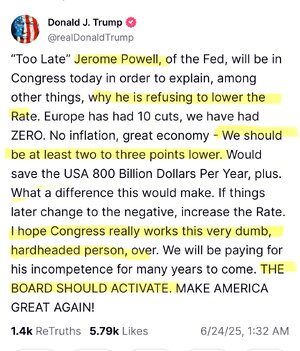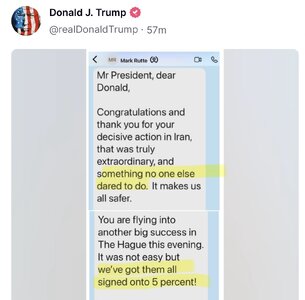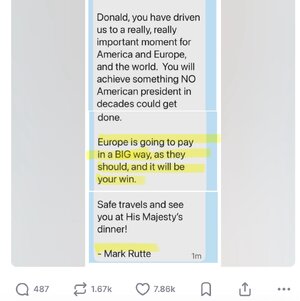When is Heaven sending the paperwork?
Navigation
Install the app
How to install the app on iOS
Follow along with the video below to see how to install our site as a web app on your home screen.
Note: This feature may not be available in some browsers.
More options
You are using an out of date browser. It may not display this or other websites correctly.
You should upgrade or use an alternative browser.
You should upgrade or use an alternative browser.
CURRENT EVENTS
- Thread starter nycfan
- Start date
- Replies: 2K
- Views: 31K
- Politics
superrific
Legend of ZZL
- Messages
- 8,353
Not me. There's no such thing as a legit Trumper. They are not allowed to be serious people even if they wanted (which they don't). See also Marco Rubio, Scott Bessent.I admit that Bondi has been far worse than I imagined possible.
superrific
Legend of ZZL
- Messages
- 8,353
Unreal. Why did they bother with the habeus opinion if they are just going to do this? Are they intentionally trying to get our hopes up, only to dash them?
As I've said before, the issuance of all these stays is the worst form of "judging." It's not actually judging at all. It's a destruction of the rule of law. Republicans don't need to pass the bill preventing lawsuits against the administration. The Supreme Court did it for them.
As I've said before, the issuance of all these stays is the worst form of "judging." It's not actually judging at all. It's a destruction of the rule of law. Republicans don't need to pass the bill preventing lawsuits against the administration. The Supreme Court did it for them.
superrific
Legend of ZZL
- Messages
- 8,353
These fuckers -- by the way, ACB hasn't dissented from ANY of these stays -- just withdrew the United States from the Convention Against Torture. So much for judicial restraint and not interfering with the executive's foreign policy powers.
This is worse than I possibly imagined. They aren't issuing opinions, which is to say they aren't having to explain themselves -- which is a bare minimum requirement of the rule of law. They are not promulgating rules that lower courts can follow. They are making no efforts to be uniform in the application of the law. This posture is the Supreme Court picking winners and losers based on whims.
Whenever a Dem gets power, he needs to throw the six in a hole in Gitmo as enemy combatants. Maybe he could give them 6 hours notice.
This is worse than I possibly imagined. They aren't issuing opinions, which is to say they aren't having to explain themselves -- which is a bare minimum requirement of the rule of law. They are not promulgating rules that lower courts can follow. They are making no efforts to be uniform in the application of the law. This posture is the Supreme Court picking winners and losers based on whims.
Whenever a Dem gets power, he needs to throw the six in a hole in Gitmo as enemy combatants. Maybe he could give them 6 hours notice.
- Messages
- 2,766

Recycled Polyester Saved This American Factory. Environmentalists Hate It
Unifi survived competition from China by helping fashion brands meet sustainability goals. But not everyone agrees that its polyester made from recycled plastic bottles should be produced in the US.
After driving through a sweet little neighborhood of small homes, you crest the hill and see the Unifi facility on your right: giant silver-gray buildings perched on a tidy, gently rolling lawn that looks like an advertisement for organic milk. A small solar farm sits off to the side, and 18-wheelers branded in grass-green and sky-blue livery pull in and out of the property, dropping off clean PET plastic flake and picking up shipments of polyester fiber.
This is the flagship factory where one of the world’s most popular so-called sustainable fibers is manufactured: polyester made from recycled plastic bottles. In the last 18 years, more than 42 billion bottles have flowed globally through the owned and partner facilities of Unifi and been turned into a branded polyester fabric Unifi calls Repreve.
...
Repreve’s promise to brands and shoppers is that turning bottles into fiber reduces greenhouse gas emissions by up to 60 percent when compared to virgin polyester fiber, and water consumption by up to two-thirds. Unifi and its brand partners (like the ones I saw in the showroom, and more) also claim to keep old water bottles from going to landfills, incinerators, or the ocean.
It’s because of this promise that this Unifi factory survived the Great Offshoring of textile manufacturing, and the onslaught of cheap Chinese polyester.
Not everyone agrees recycled polyester is part of a better future. Nike is one of Unifi’s biggest customers and has bragged that the sportswear brand alone diverts more than one billion plastic bottles a year from landfills and waterways. In May of 2023, a Missouri consumer filed a greenwashing lawsuit against Nike, alleging in part that the recycled polyester in Nike’s shoes and shirts isn’t actually sustainable. The lawsuit was dismissed, along with a similar complaint against H&M, but it expressed a bubbling resentment against corporations that use recycled polyester to green up their image without addressing the many other forms of environmental and human damage of plastic fashion.
Bottle-to-polyester recycling, once thought to be a key tool in combating our global plastic pollution problem, has been under fire for a few years. “We’ve been led to believe that recycled and sustainable are synonymous, when they are anything but,” Maxine Bédat, executive director of the New Standard Institute, a nonprofit pushing for a sustainable fashion industry, told The Guardian in 2021. (When I asked her if she stands by that statement today, she said yes.)
I’m here in Yadkinville because I wanted to see this operation for myself and decide: Is recycled polyester actually sustainable? Or, as many now claim, is it greenwashing, a get-out-of-jail-free card for brands who want to look like they’re saving the planet while going on with their toxic, fossil-fueled business as usual?
Over the past two years, that question has morphed into an even more fraught one: Does this factory provide the kind of good, safe factory jobs that Americans say they yearn for, and that Trump’s proposed tariffs purport to bring back to our shores?
...
When Coca-Cola first introduced its PET plastic bottle in 1978, Unifi’s founder Allen Mebane worried the beverage industry would take up all the supply of PET resin. Instead, 20 years later, the opposite has happened, with polyester plants buying up the supply of used water bottles. Forty to 60 truckloads of plastic waste get dropped off at Unifi’s bottle processing plant per week, bought from material recovery facilities as far away as Michigan and Maine.
In 2023, the CBC did a high-profile investigative piece into fashion’s greenwashing, and focused most of its critique on recycled polyester. “If you're using plastic bottles, you're actually taking bottles out of a potentially closed-loop recycling system, and then giving them a one-way ticket to a landfill disposal,” George Harding-Rolls, a sustainable fashion advocate, told the CBC.
But most bottles aren’t being recycled anyway. The collection rates for PET plastic started rising around the time Unifi debuted Repreve, hitting 30 percent in 2012 and hovering around there for a decade. Meanwhile, demand for recycled PET from both the fashion and packaged food industry, who have both committed to sourcing recycled material, has soared. It’s expected to outpace supply by 2030.
“You know who's complaining about it? The bottle companies,” Ingle says. “Because they believe the textile industry is taking their bottles.”
“Is that true?” I ask.
“Well, yeah,” he laughs. “The market for recycled bottles is very transparent. The price of recycled bottles changes twice or sometimes three times a week. So if you want to buy a bottle and turn that bottle back into a bottle, have at it. Nobody is stopping the bottle industry from doing that.”
Well, there is one thing. Unifi’s willingness to pay more for old bottles, because it’s turning them into a premium product that brands and consumers will pay more for, may be driving the market rate of old water bottles up. But nobody wants to pay more for a soda in a bottle made with recycled plastic.
...
North Carolina made it illegal to throw out plastic water bottles in 2009, but despite pleas to supply local industry with material so it can create jobs, a 2021 report put the state’s PET recycling rate at a measly 8 percent. Ingle thinks if North Carolina passed a bottle bill that levied a 5- or 10-cent deposit on each bottle, Unifi could get everything it needs from within its borders. “Unifi is involved at the state level in various efforts to increase the recycling rates of PET post-consumer bottles,” he later wrote by email.
...
- Messages
- 2,766
There are legitimate questions about whether the Unifi plant can be considered a clean and green workplace.
In the bottle processing plant in Reidsville, North Carolina, drifts of plastic particles, like snow banks, are piled in every nook of the machinery that chops the bottles into flake. When I ask our tour guide, a floor manager, if he worries about breathing it in, he says he doesn't. "We do a good job of cleaning it up," he says, adding that the bags of dust that are vacuumed up are sold off, and the wastewater is filtered.
But I’m concerned. A 2023 study of a UK plastics recycling plant found that even after the installation of state-of-the-art filters, around 6 percent of the plastic being processed was released into the wastewater as micro and nanoplastic, while the air around the facility was full of microplastics small enough to be hazardous to human health.
Scientists are still puzzling out what microplastics do to our health, but one study found that people with IBS tended to have more microplastics, including PET and polyamide (of which nylon is one type), in their gut. While PET seems to be one of the most benign out of all the plastics, at least two studies have found BPA, a hormone-disrupting chemical, in polyester baby clothing, and a number of brands agreed to a settlement with California lawmakers in 2023 over the presence of BPA in polyester athletic shirts.
In addition, water utility managers in Reidsville have alleged that Unifi and other polyester manufacturers could be potentially be sources of 1,4-dioxane, a probable human carcinogen, in the Cape Fear watershed, which provides drinking water for over 1 million people as it flows from central to southeast North Carolina. Technically, that’s not illegal (especially since Unifi, along with other industrial sources and several towns, successfully lobbied against a North Carolina rule limiting 1,4-dioxane in wastewater). Because 1,4-dioxane is a byproduct of manufacturing PET resin, the EPA declared in late 2024 that almost any exposure to 1,4-dioxane constitutes an unreasonable risk to the health of polyester workers and surrounding communities. There are (very costly) ways to treat wastewater for 1,4-dioxane, so how ensuing regulations would affect Unifi remains to be seen, especially since the EPA doesn’t currently seem keen to do any regulating of toxic chemical exposure.
Ingle and Boyd both declined to speak in detail about these issues. In person, they cited the advice of Unifi’s counsel (BPA), said Unifi follows all regulations (1,4-dioxane), or pled ignorance (microplastics). Follow-up questions to Boyd went unanswered. Ingle responded to follow-up questions via email by writing, “We maintain active participation in The Microfibre Consortium, in order to support academic and industry research into the source and impact of fiber fragmentation from textiles into the natural environment.” And “We are compliant with all local, state, and federal regulations for all of our sites.”
To advocates, each micro-scandal is proof that there is no environmentally friendly polyester. “We can't do this sustainably in a nontoxic way, it's literally impossible,” Pecci says.
But I left the Repreve plant wondering if we’re letting perfect be the enemy of good American jobs. Polyester will continue to be in demand, and it will either be made here in a compliant factory using recycled sources, or abroad in a sketchy factory using fresh petrochemicals. Pecci says she doesn’t want to “call out that company or those people, because they might be the nicest people in the world doing the best they can with what they have.” She described for me a utopia in which nontoxic and natural clothing is all made here and then composted and recycled here. Sounds gorgeous, and impossible.
In February of this year, Unifi announced it was closing its Madison, North Carolina, polyester processing plant. It would ship some of its machinery to its Latin American plants, and offer the Madison employees new job opportunities at the Yadkinsville and Reidsville plants, which remain in service.
For now, anyway.
In the bottle processing plant in Reidsville, North Carolina, drifts of plastic particles, like snow banks, are piled in every nook of the machinery that chops the bottles into flake. When I ask our tour guide, a floor manager, if he worries about breathing it in, he says he doesn't. "We do a good job of cleaning it up," he says, adding that the bags of dust that are vacuumed up are sold off, and the wastewater is filtered.
But I’m concerned. A 2023 study of a UK plastics recycling plant found that even after the installation of state-of-the-art filters, around 6 percent of the plastic being processed was released into the wastewater as micro and nanoplastic, while the air around the facility was full of microplastics small enough to be hazardous to human health.
Scientists are still puzzling out what microplastics do to our health, but one study found that people with IBS tended to have more microplastics, including PET and polyamide (of which nylon is one type), in their gut. While PET seems to be one of the most benign out of all the plastics, at least two studies have found BPA, a hormone-disrupting chemical, in polyester baby clothing, and a number of brands agreed to a settlement with California lawmakers in 2023 over the presence of BPA in polyester athletic shirts.
In addition, water utility managers in Reidsville have alleged that Unifi and other polyester manufacturers could be potentially be sources of 1,4-dioxane, a probable human carcinogen, in the Cape Fear watershed, which provides drinking water for over 1 million people as it flows from central to southeast North Carolina. Technically, that’s not illegal (especially since Unifi, along with other industrial sources and several towns, successfully lobbied against a North Carolina rule limiting 1,4-dioxane in wastewater). Because 1,4-dioxane is a byproduct of manufacturing PET resin, the EPA declared in late 2024 that almost any exposure to 1,4-dioxane constitutes an unreasonable risk to the health of polyester workers and surrounding communities. There are (very costly) ways to treat wastewater for 1,4-dioxane, so how ensuing regulations would affect Unifi remains to be seen, especially since the EPA doesn’t currently seem keen to do any regulating of toxic chemical exposure.
Ingle and Boyd both declined to speak in detail about these issues. In person, they cited the advice of Unifi’s counsel (BPA), said Unifi follows all regulations (1,4-dioxane), or pled ignorance (microplastics). Follow-up questions to Boyd went unanswered. Ingle responded to follow-up questions via email by writing, “We maintain active participation in The Microfibre Consortium, in order to support academic and industry research into the source and impact of fiber fragmentation from textiles into the natural environment.” And “We are compliant with all local, state, and federal regulations for all of our sites.”
To advocates, each micro-scandal is proof that there is no environmentally friendly polyester. “We can't do this sustainably in a nontoxic way, it's literally impossible,” Pecci says.
But I left the Repreve plant wondering if we’re letting perfect be the enemy of good American jobs. Polyester will continue to be in demand, and it will either be made here in a compliant factory using recycled sources, or abroad in a sketchy factory using fresh petrochemicals. Pecci says she doesn’t want to “call out that company or those people, because they might be the nicest people in the world doing the best they can with what they have.” She described for me a utopia in which nontoxic and natural clothing is all made here and then composted and recycled here. Sounds gorgeous, and impossible.
In February of this year, Unifi announced it was closing its Madison, North Carolina, polyester processing plant. It would ship some of its machinery to its Latin American plants, and offer the Madison employees new job opportunities at the Yadkinsville and Reidsville plants, which remain in service.
For now, anyway.
WaynetheDrain
Iconic Member
- Messages
- 1,171
God’s response: Go fuck yourself.
Machinehead
Active Member
- Messages
- 44
ChileG
Iconic Member
- Messages
- 1,765
And so on.
which is why the Dow is still 1000 points lower than when he took office, interest rates remain high, and economic growth has stalled.
theel4life
Iconic Member
- Messages
- 1,475
- Messages
- 21,321
Nearly Two Million Student-Loan Borrowers Are at Risk of Docked Pay This Summer
The government is set to start garnishing wages after a pandemic-era reprieve ended
“… Roughly six million federal student-loan borrowers are 90 days or more past due after a pandemic-era reprieve ended, according to TransUnion. The credit-reporting company estimates that about a third of them, or nearly two million borrowers, could move into default in July and start having their pay docked by the government.
… An additional one million borrowers are on track to default by August, followed by another two million in September. Borrowers fall into default when they are 270 days past due.
… Wage garnishment is also set to restart this summer. Until past due payments are paid in full or the default status is resolved, borrowers could see up to 15% of their wages automatically deducted from their paychecks.
Student-loan payments were paused during the pandemic. In 2023, the Biden administration gave borrowers a 12-month “on-ramp” period where late or missed payments wouldn’t hurt their credit scores. That period ended last fall.
Borrowers who have been newly reported as delinquent since then on their student loans have seen an average 60-point drop in their credit scores, according to TransUnion. Nine percent of borrowers who fell into delinquency were current on their payments by April, according to TransUnion. …”
WaynetheDrain
Iconic Member
- Messages
- 1,171
Poor RINO Ronnie Reagan! Can’t even get credit where credit is due anymore in today’s Republican Party.
Technically, Ronnie stole that from the Roman Emperor, Hadrian.
“Peace through Strength”

- Motto of the 8th Air Force in WW2 (VIII Bomber Command)
- Alexander Hamilton wrote about it in one of the Federalist Papers
- It was part of one of George Washington’s State of the Union addresses
- Barry Goldwater’s foreign policy positions during the 1964 presidential campaign was “Peace through Strength”
- Bernard Baruch wrote a book in the 1950’s titled, “Peace through Strength”
- Messages
- 21,321
Share:





